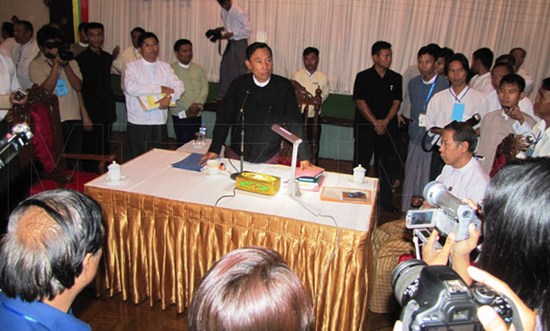Lower House Speaker Shwe Mann, speaking to the Mandalay City Development Committee this week, said changing “mindsets” is a first step in creating positive laws that will aid the people.

Difficulties are common during a political transition period “while transforming from one era to another and one system to another,” he said. “To change the law, we must change our mindsets first.”
It is necessary to change basic thoughts and actions in order to create positive changes, he told an audience of lawmakers, officials, businessmen and citizens.
During the last session of Parliament, Shaw Mann added to reformist credentials, particularly in pushing through an extra pay allowance for all government workers, seen as an important step to remove corruption from a bureaucracy long accustomed to “tea money” and bribes for simple government services.
Reviewing the workings of the Lower House, Shwe Mann said originally there were four committees, but 15 new committees or commissions were created in the last two sessions out of necessity, according to an article in The New Light of Myanmar, a state-run newspaper on Thursday.
One of the most important, he said, was the Legal Affairs and Special Cases Assessment Commission, which is tasked to suggest news laws or laws to abolish and to provide advice to other committees with suggestions through the speaker regarding political, economic, social and technological issues.
The various committees and commission are comprised of legal specialists, people experienced in international affairs and specialists from revenue, education, health, science and technology fields, he said.
Shwe Mann stressed the importance of undertaking legislation that touched directly on the needs of the people, and for representatives to put forward proposals, bills and laws.
He said Burma’s political transition could be completed only through legislation, and not by orders. To enable the representatives to perform their duties successfully, the suggestions of local elders, businessmen, merchants and intellectuals are very important, he said.
He asked people from Mandalay and Sagaing regions who attended the meeting to play a leading role in political and social affairs.
One of the future tasks, he said, is for Parliament to take actions to face global challenges related to regional and international trade. He said Parliament itself needs to be strengthen and consolidated, and he urged MPs to put the needs of the people first and to avoid racism, sectarianism, and dogmatism.
The Lower House, he said, has performed well under the circumstances. He said the Parliament has managed to function well to certain extent. The next session of Parliament is expected to begin in late April following the by-elections.


